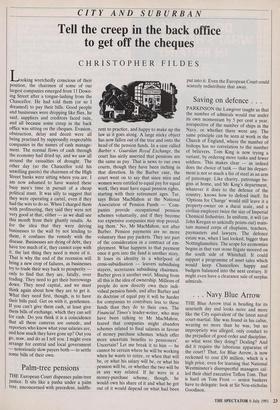Saving on defence . . .
PARKINSON the Lawgiver taught us that the number of admirals would rise under its own momentum by 5 per cent a year, irrespective of the number of ships in the Navy, or whether there were any. The same principle can be seen at work in the Church of England, where the number of bishops has no correlation to the number of believers. Tom King is now trying a variant, by ordering more tanks and fewer soldiers. This makes clear — as indeed does the choice of tank — that his depart- ment is not so much a fist of steel as an arm of patronage. Like charity, patronage be- gins at home, and Mr King's department, whatever it does to the defence of the country, knows how to defend itself. Its `Options for Change' would still leave it a property-owner on a ducal scale, and a civilian employer twice the size of Imperial Chemical Industries. In uniform, it will (as John Keegan so unkindly points out) main- tain massed corps of chaplains, teachers, paymasters and lawyers. The defence estate was, when I last looked, bigger than Nottinghamshire. The scope for economies begins in that vast stone frigate moored on the south side of Whitehall. It could support a programme of asset sales which would keep Chancellors happy and budgets balanced into the next century. It might even have a clearance sale of surplus admirals.


















































 Previous page
Previous page